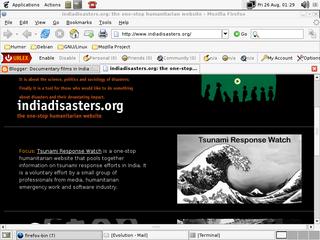This is an article on
Rupashree Nanda's film on drought, hunger and exploitation in Orissa.
By some coincidence, one of our local newspapers here in Goa, the
The Navhind Times carried a review of this documentary. Writer Bibhuti Mishra described it thus:
Villagers in the dry land of Bolangir in Orissa battle hunger, succumb to starvation and sell off children to survive. Landless and the marginal farmers are subjected to one of the worst forms of exploitation. In this sage a human suffering, both human and constitutional rights are violated year after year.
When an email came from here last, in January 2005, Rupashree Nanda's email address was rupsnanda at rediffmail.com (no spam please!). She had then forwarded a mail from the innovative BYOFF, started at Puri (Orissa). If you're wondering what that is, it stands for the bringyourown film festival, the organisers of which can be contacted at byoffpuri at rediffmail.com.
That forwarded mail was a note from BYOFF to say that:
We wish to clarify that anybody can come with a film (made in any format) irrespective of the year in which it was made as long as the film has not been presented in BYOFF earlier. Yeah, even the Lumiere brothers are also welcome. As you know, BYOFF started with the idea of no awards, no juries, no selection and no hierarchy. The festival intends to go beyond and create a space for filmmakers, cinephiles, writers, painters, singers and artists from other fields to gather at one place, share their work, encourage the young ones and appreciate the old bosses. Artistes from other fields are also welcome to show their works. Don't have anything to show? No problem. Just come over and be one of us.
Nice to read of Rupashree Nanda's work. This is one film I'd like to have the chance to view! Needless to say, Indian documentary film-makers do deserve a better profile in the (print, but not only it) media.



